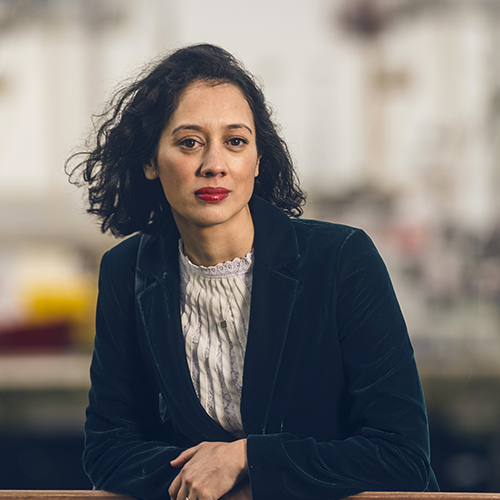
Master of International Trade – MIntTr
Gain the skills to shape trade agreements, influence policy, and navigate global economic relationships. Study a multidisciplinary programme that integrates legal, economic, political, and cultural insights.
The people you work with and learn from are an important part of your studies. Learn who the teaching staff are for the Master of International Trade, and hear from two students and a lecturer.
Academic staff
- Dr Matthew CastleDr Matthew Castle—International law, international trade law, globalisation and culture
- Prof Eberhard FeessProf Eberhard Feess—Law and economics, behavioural economics, competition policy, sports economics, health economics
- AProf Meredith LewisAProf Meredith Lewis—International trade law, international economic law
- Dr Nikita MelashchenkoDr Nikita Melashchenko—Data barriers in international trade law, regulation of technology, WTO law, international intellectual property
- Dr Nathaniel Robson—Macroeconomics, economic modelling and simulation, econometrics
- Dr Michelle ZangDr Michelle Zang—International law, international trade law, litigation, adjudication and dispute resolution
Stories

Krissy Grace
Master of International Trade student
The Master of International Trade was intellectually stimulating and challenging. I was able to engage and stretch my brain in ways that it wasn’t used to.
A world of opportunities
Due to the flexibility of the degree and the connections she made through Victoria University of Wellington, Krissy was able to work as an intern in Brussels for three months—and then use this experience to write a research paper for her degree.
“I was able to select a research project that enhanced my contribution to the trade-related work I was doing in my day job, and take advantage of internship opportunities offered through Victoria University of Wellington’s numerous networks. The direct result of this was that I was able to intern in the Parliament of the European Union.”
A new confidence
Krissy credits her time studying towards the Master of International Trade with giving her many connections she wouldn’t have otherwise had—or even realised were available to her.
“With the opportunities on offer like my European Parliament internship, and the exposure to a range of international academics and experts, as a student you can’t help but absorb, and grow, and feel more confident about your understanding of international trade.”
A competitive edge
Since beginning the degree, Krissy has taken up a role as a Foreign Policy Officer in the Trade Negotiation division of the Ministry of Foreign Affairs and Trade—something she credits the Master of International Trade with helping her achieve.
“I would highly recommend taking up postgraduate study at any point in your career. I was able to engage and stretch my brain in ways that it wasn’t used to. Like any worked-out muscle in the body, I am now mentally stronger and more capable.”

Aaron Booker
Master of International Trade student
I’ve found classes very engaging. It feels like everyone really wants to be there and actively contribute to discussions.
Theory, practice and policy
A highlight of the degree has been the chance to learn from both internationally-respected academics and experts working in the field.
“I’ve enjoyed being able to listen to and talk with well-respected and experienced practitioners of international trade. Hearing their inside perspectives on how previous negotiations played out, and their expectations for the future, has been especially valuable.”
Learning different frameworks
The chance to learn from different disciplines and discover his own particular areas of speciality has been a highlight for Aaron, and one of the main reasons he would recommend studying for a Master of International Trade.
“I have particularly appreciated hearing staff from different faculties discuss the same issues, developing my understanding of how to apply different frames of analysis, and to make connections between them.”
Building networks
Throughout his degree, Aaron has valued building collaborative relationships with staff and other students.
“I’ve enjoyed the open and collegial relationship with staff, which has felt more like a peer relationship than the student-lecturer relationship at undergraduate level. I’ve found classes very engaging. It feels like everyone really wants to be there and actively contribute to discussions.”
Susy Frankel
Professor, Chair in Intellectual Property and International Trade
What makes international trade exciting is the importance of getting the policy and law right in order not only to maximise the benefits of trade, but to effectively address the social policies and conditions that global trade impacts.
A unique opportunity
The Master of International Trade is a great thing to study because it offers a unique opportunity to understand international trade law, economics, and political economy, as well as a variety of cultural and critical perspectives impacting trade. No other university in New Zealand or Australia offers such a multidisciplinary approach.
Trade issues in a globalised world
Much of my research is on the nexus of intellectual property and international trade and the significant issues it raises. Like retaining cultural identity in a globalised world and the degree of domestic regulatory autonomy that countries have over healthcare and consumer protection when there are also intellectual property interests involved, such as trademarks on tobacco products.
A New Zealand perspective
For New Zealand these trade issues are extremely important and they impact many aspects of daily life, such as the costs and availability of products—from pharmaceuticals to films. These issues also impact the role of Māori culture and its intersection with trading interests.
Understanding through a multidisciplinary lens
I began to teach international trade law in order to unpack the intellectual property and trade relationship and how that governs research and innovation in the 21st century. There are some complex questions in this field that raise legal and political economy issues. They cannot be effectively and practically addressed through the lens of one discipline.
Take for example biosecurity regulation, which is a mix of law and science, aimed at achieving important public policy goals such as preserving native species. Trade’s impact on public concerns like the environment and the cost of healthcare should be explored through law, political economy, economics, and development studies and so on.
Getting it right for everyone
What makes international trade exciting is the importance of getting the policy and law right in order to not only maximise the benefits of trade, but to effectively address the social policies and conditions that global trade impacts.
Previous
RequirementsNext
How to apply

